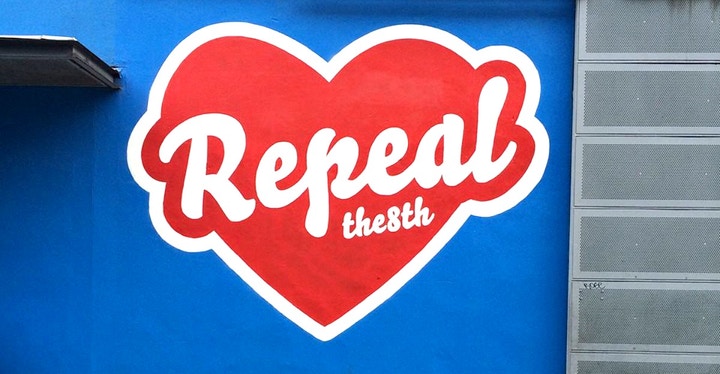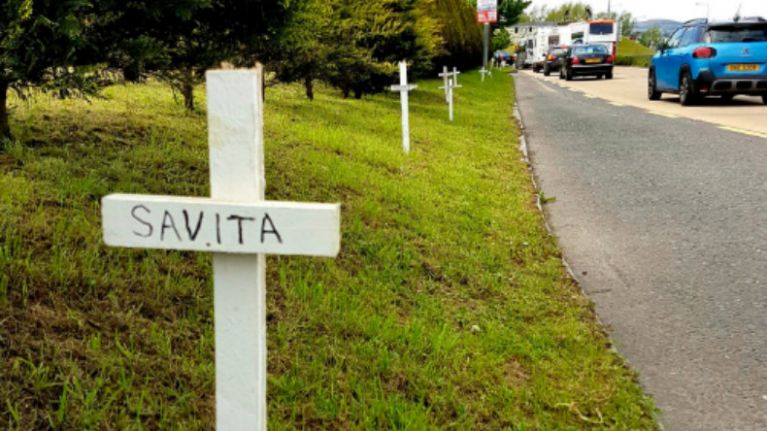This week, In Her Shoes founder, Erin Darcy, outed herself on the Facebook page, having been its anonymous primary moderator since January of this year. Erin is a young mother of three who gave birth to and is raising her children in Ireland but as an immigrant has no voting rights herself in the forthcoming referendum. This extraordinary page, recounting the individual stories of women who have travelled for terminations, has been her contribution to the Repeal campaign. Knowing this drives home the fact that so many women without electoral influence (and their families) are nonetheless affected by the Eighth Amendment simply because they become pregnant in this country.
She speaks about the unforeseen magnitude of the page, which has over 100,000 followers and a potential reach of millions through reposts. This is staggering but what is most moving is the scale of submissions, with over 600 as yet unmoderated. It’s Tuesday evening as I write this. Since Erin posted her own video a little after 5pm yesterday, ten more stories have been added. She has pledged to keep the page going after the referendum (whatever the result) to honour the voices of the women whose stories have not yet been posted.
This article is hard to write, not because I’m struggling with the subject matter but because I’m emotionally exhausted by the campaign. I’ll nail my own colours up here and say that I have never, to my knowledge, been pregnant – never had to deal with the thrill/terror, never had my body go through that transformative and often brutal process – but I feel as though a layer has been scraped off my inner organs all the same. As we near the end of this campaigning process, I feel bruised.
The right to terminations for women who feel they cannot go through with a pregnancy is self-evident to me. I don’t need the so-called “hard cases” to help me decide that this constitutional amendment is inhumane. As far as I’m concerned, the decision to terminate a pregnancy is never easy, so they are all hard cases.
What this whitewashing “hard cases” term refers to is an array of truly horrific circumstances that should never be visited upon anybody and if they are, every merciful measure should be extended to the victims (of a fatal foetal abnormality diagnosis, a rape, incest, etc.). At this juncture, I’m done with those who say they have sympathy with people in such circumstances but can’t “in all conscience” vote Yes. I’ve seen that term bandied about: “in all conscience”. So, these people have done their moral due diligence, and the hard cases are very unfortunate but such is the price of their moral probity? If this is you – if you have turned away from stories like those in the Women of the Eighth and People of the Eighth videos, for fear you might be swayed from your certainty, or if you have watched them and are still resolute – I am done with you. The Yes campaign has achieved unprecedented exposure for just such stories through grassroots community activism, the power of social networks and an incredibly wide and varied degree of advocacy, so you know these stories exist – don’t pretend otherwise. If the Eighth remains in situ and these things continue to happen, you cannot claim that you didn’t know.
I’m grateful to people who have patiently argued with those who see abortion as murder “plain and simple” but I’m afraid I was done with that branch of Naysayers a few weeks ago. Where, beyond their specific doctrine, is it written that a dependent foetus, not yet viable, has unassailable rights outside of the mother’s? How dare they look past the experience and wishes of the sentient person who must host this being – with all that entails – and decide for her what she should do? All arguments concerning alternatives fall down in the face of this – the long-established reality is that accidents sometimes happen amongst sexually consenting adults and, when they do, people who become pregnant must have the autonomy to decide what happens to their own bodies. I won’t even dwell on the lack of logical extension regarding social care and financial support for families living in Ireland today. Anyway, these arguments have been well made by many besides me. I hope they have been enough to see through the repeal of this amendment. For sure, the naked contempt displayed for women and utter abandonment of factual argument in much of the No campaign’s material will have done its part too.
What Erin’s video also drove home to me, as with cheering support from solidarity groups in London, Berlin, Utrecht and elsewhere, and the focus of non-Irish media on the opposing campaigns, is that this referendum has significance well beyond the colloquial world of Irish politics and society. The world is watching to see what will happen here on Friday. Certainly, sinister religious groups in the US, who have provided heavyweight finance for the No campaign, are watching. But I’m thinking, moreso, of the women in Poland, who often have to travel to neighbouring Germany to avail of services because of limited access in their own country.
On 3rd October 2016, a day that became known as Black Monday, 116 thousand Poles turned out to protest a draconian bill that would have restricted abortion access in all cases except where the mother’s life is threatened. Sound familiar? The proposed bill was very narrowly defeated but conservative political forces in the country have repeatedly tried to deny and restrict women’s reproductive rights.
In Italy, anti-abortion groups have been using the Irish No campaign as a paradigm in the ramping up of their own propaganda. Although abortions are legal in Italy, there are many difficulties for women accessing services because of parochial pressures on practitioners (there has been a marked increase in the number of conscientious objections registered by medics in the forty years since abortion was legalised in the country).
And of course, this referendum has enormous implications for our sisters and everyone with reproductive capability North of the Republic’s border, where abortion access is similarly restricted. They must feel heavily invested in its outcome.
So what this means is that Ireland is now a test model for progress in women’s reproductive rights, much as it was for LGBT marriage equality rights during the 2015 referendum. This little country, which has been stamped on by colonial boots and hidebound by religious zealotry, is again under intense international observation, to see whither the wind of progress blows. The outcome of Friday’s vote will have meaning far beyond these shores. And there are thousands upon thousands more In Her Shoes stories to be told by women in other places and other languages. I will be walking in all of their shoes to the polling booth (don’t worry, I’ll leave early).
The Repeal campaign has been an astonishing example of participatory democracy in action. Starting with the Citizens Assembly, which took account of over 1200 open submissions and whose recommendations formed the basis of the proposed heads of bill, the movement to repeal the Eighth Amendment has inspired collective acts of undaunted imagination and unstinting solidarity. To give just a few examples: Women stood with suitcases in airport and ferry terminals to represent those who for decades have been forced to travel. People made art, crafts, food, merchandise, many things besides, and sold them to raise funds for the Repeal campaign. An alliance of pro-choice activists rowed down the Liffey in a “Get the Boat to Vote” demonstration. Women made and wore prosthetic white wings so they could block the view of offensive imagery posted at maternity hospitals. And in Donegal, a lone woman painted the names of dead women on white roadside crosses that were illegally erected by the No campaign to represent the unborn.
But the principal campaign has been conducted on the pavements by volunteer canvassers who have given up their time to meet with and talk to other voters. And behind closed doors many have attempted to convince people close to them of the imperative for a Yes vote.
It’s as if we learned how to do it three years ago and we’re doing it more, and better. Like we’re learning that we ARE the body politic and we must put our elected representatives to work for us. And in doing so, we are giving lessons in how to make the personal political. (To this end, the Taoiseach and other cabinet ministers have publicly urged the electorate to vote Yes on Friday.)
I dare not think how I will feel if this referendum returns a No majority. As an Irish person. As a woman in the world. I cannot adequately express how much a Yes vote means to me as a human being. I can’t appeal any further other than to iterate once more, Repeal the Eighth. There will still be much to do to legitimise, enshrine and protect women’s reproductive rights after this has been achieved.
Further reading:
https://www.citizensassembly.ie/en/
https://www.togetherforyes.ie/about-us/who-we-are/
http://www.alliance4choice.com/
http://www.upworthy.com/when-the-city-painted-over-this-abortion-rights-mural-artists-got-creative
http://donegalnews.com/2018/05/white-crosses-emblazoned-with-names-of-tragic-women/






